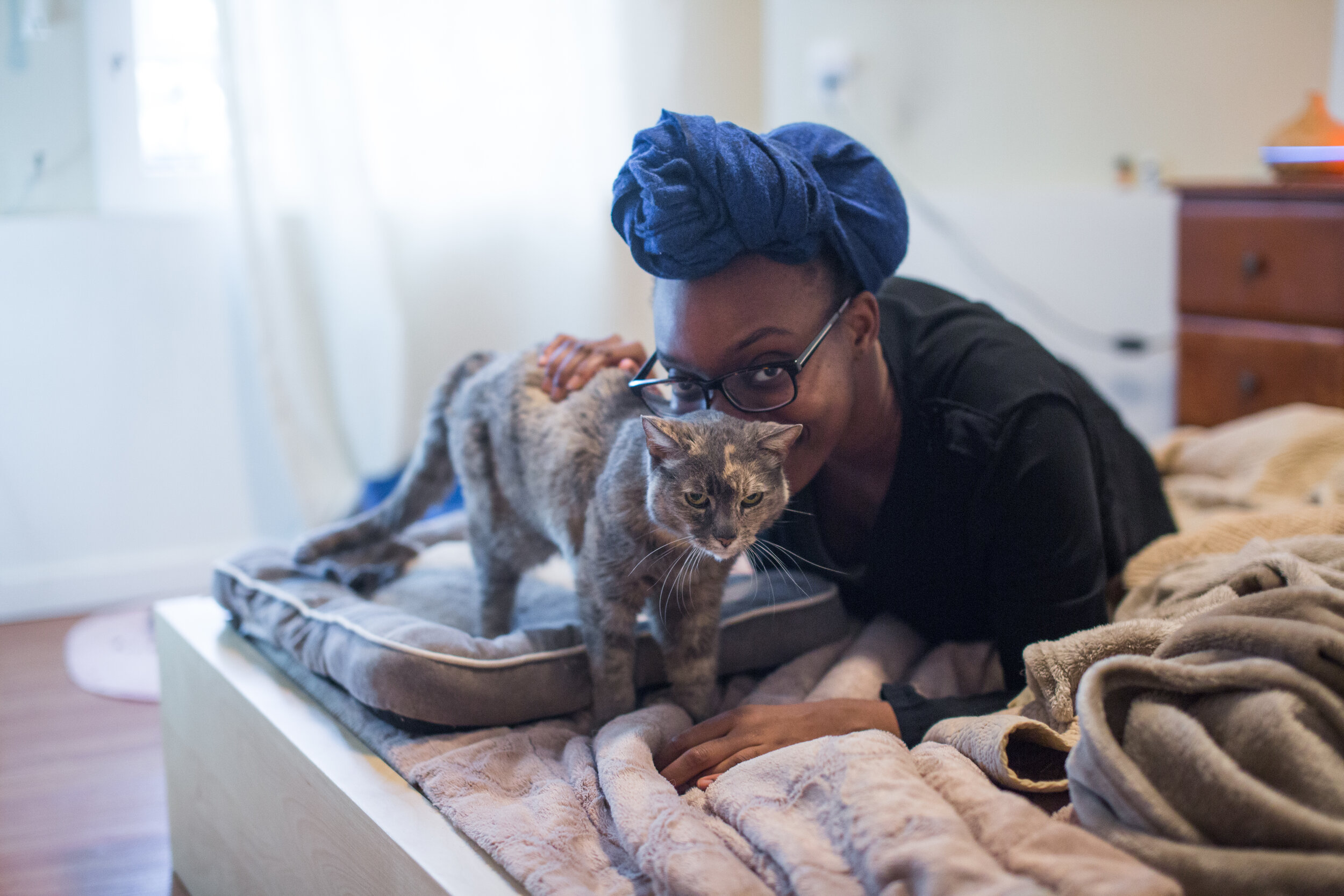Cats and Fireworks
While the Fourth of July can be a day filled with barbecues and fireworks for humans, the holiday’s bright lights and loud noises make it a day of fear and stress for a lot of our feline companions.
Did you know that cats have super sensitive hearing? With one of the broadest hearing ranges among mammals, they can hear higher-pitched sounds more than humans and most dogs. They can hear things that we do, but a lot louder. This can make fireworks extra frightening. The loud noises and flashes of fireworks can cause cats to panic, bolting around in search of a safe place. A thirty-minute fireworks show may seem short to us, but for a frightened cat, it can feel like a much longer stretch of disorientation. This fear, confusion, and desperation to find a safe space can lead to pets running away. According to the ASPCA, 1 in every 5 lost pets goes missing after being frightened by the sound of fireworks, thunderstorms, or other loud noises.
Keep an eye on Facebook and Nextdoor, and check your city or county website to see when firework festivities are planned for your area. If it’s your first Fourth of July holiday with your cat, it’s a good idea to stay home with them to see how they react to the sounds and be ready to see what you can do to help make the night less scary for them.
Read on for tips to help keep your cat calm during the Fourth of July!
Keep your cat indoors
If your cat has indoor/outdoor access, keep them inside on nights there are fireworks. Make sure all your windows are closed, and if you have a cat flap on any doors, secure those as well. If you have guests over, let them know your cat might try to escape when the front door opens and to enter and exit carefully.
Don’t confine your cat into a small space, since they could injure themselves if they try to escape. Let them have access to all the safe areas of your home.
If they aren’t already, get your cat microchipped (all Cat Town cats are microchipped!) so if they end up escaping, they can be easily identified and returned to you. Oakland Animal Services will microchip Oakland dogs and cats for $10 — learn more at oaklandanimalservices.org/services/dog-licensing.
Create a comfortable space for your cat
When they get scared, cats like to go hide where they feel safe. If your cat has a go-to favorite hiding place, such as under a certain chair or under the bed, fill the space with comfortable blankets to help them feel secure while they hide out during the fireworks. You can put their favorite toys there too, along with a few treats to entice them to stay there.
Don’t be surprised if your cat stays there long after the firework show has ended, and don’t try to lure them out or grab them either — this can stress them out even more. Your cat may be able to hear fireworks that are further away too, so wait for them to come out when they feel that it’s safe to do so.
If your cat is especially sensitive, you might notice that the bright flashes of light from fireworks make them feel anxious, especially if there’s a show nearby. Closing the curtains or even hanging blankets over the windows can help. Consider buying blackout curtains so you’re prepared for the next Fourth of July.
Distract your cat with other sounds AND playtime
You can try to further muffle the sound of fireworks for your cat by putting on the TV or turning on a fan or your air conditioning. You can also try playing music. A recent study by researchers at Louisiana State University School of Veterinary Medicine found that playing cat-specific music before and during a trip to the vet reduced a cat’s stress levels and helped them to feel calm. Researchers used David Teie’s Music for Cats, which the New York Times describes as “a series of whirring, lilting and at times squeaky musical tracks designed for cats’ brains and ears.”
Plan ahead and have some new toys on hand for the evening, like a wand toy or mylar balls, for your cat to play with during fireworks. Playtime can be an excellent distraction, especially if you have a very playful cat! You can also try creating a treasure hunt for your cat by hiding treats around the house for them to find too.
Consider medication and/or alternative therapies
If your cat is very shy or extra noise-reactive, talk with your veterinarian ahead of the Fourth of July holiday to see if they think prescribing anti-anxiety or sedative medication is necessary.
California residents can also talk with their vets about using cannabidiol — aka CBD, a compound extracted from cannabis. California is currently the only state with legislation in place to allow veterinarians to talk about the therapeutic uses of cannabis in pets with clients. While the research on CBD and animals is still preliminary, it’s believed to have therapeutic properties and may help with anxiety, aggressiveness, and pain, according to Reader’s Digest. As with any medication, be sure to talk to your vet before giving your cat CBD, especially if they’re already on other medications. It’s also important to use CBD made specifically for animals, as CBD made for people could have added ingredients unsafe for pets.
Catnip can also be a great solution — it’s a classic for a reason! — and can help reduce stress levels in cats. Have a catnip toy or two on hand to use, especially if your cat is one who really reacts to it. You can also try using a stress-reducing calming spray or a pheromone-calming diffuser to see if they help your cat. Try using them a few weeks before the Fourth of July so you know whether they make a difference.
Think twice before deciding to use essential oils as a potential method of calming your cat. While safe for people, many common essential oils and liquid potpourri — ylang-ylang, cinnamon, clove, eucalyptus, lavender — can be toxic to cats through both ingestion and skin exposure. They contain chemicals that are absorbed rapidly, many of which are metabolized through the liver. Cats have fewer liver enzymes that are needed to effectively metabolize these oils. Kittens, very young cats, and cats with liver disease are also more sensitive to the effects of essential oils. Some essential oils and liquid potpourri can irritate or burn a cat’s skin or mouth. Depending on the product, even a small amount on the skin could be harmful to a cat. We all know cats are fastidious groomers, so if these products get onto their fur or skin, ingestion is likely.
At the end of the day, one of the most important things you can do for your cat if they’re stressed by the fireworks is to remain calm. If you’re acting calm, your cat is more likely to feel calm, too. Resist the urge to over-comfort your cat if they seem anxious — smothering them with cuddles and attention could make them more fearful. It can also take cats a while to calm down, so giving them their space is a good idea, as hard as it can be sometimes. Your cat will come to you when they’re ready!





